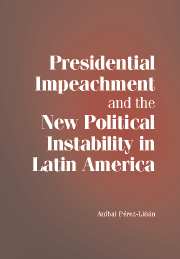Book contents
- Frontmatter
- Contents
- List of Tables and Figures
- Preface and Acknowledgments
- 1 INSTITUTIONAL CRISES IN PRESIDENTIAL REGIMES
- 2 FIVE CASES OF IMPEACHMENT AND A PRESUMED MADMAN
- 3 PRESIDENTIAL CRISES AND THE DECLINE OF MILITARY INTERVENTION
- 4 LATIN AMERICA IN THE AGE OF SCANDAL
- 5 SCANDALS AND THE POLITICAL ECONOMY OF POPULAR OUTRAGE
- 6 BUILDING A LEGISLATIVE SHIELD: THE INSTITUTIONAL DETERMINANTS OF IMPEACHMENT
- 7 TOWARD A NEW PATTERN OF POLITICAL INSTABILITY
- 8 RETHINKING LATIN AMERICAN PRESIDENTIALISM
- References
- Index
- Titles in the series
3 - PRESIDENTIAL CRISES AND THE DECLINE OF MILITARY INTERVENTION
Published online by Cambridge University Press: 25 July 2009
- Frontmatter
- Contents
- List of Tables and Figures
- Preface and Acknowledgments
- 1 INSTITUTIONAL CRISES IN PRESIDENTIAL REGIMES
- 2 FIVE CASES OF IMPEACHMENT AND A PRESUMED MADMAN
- 3 PRESIDENTIAL CRISES AND THE DECLINE OF MILITARY INTERVENTION
- 4 LATIN AMERICA IN THE AGE OF SCANDAL
- 5 SCANDALS AND THE POLITICAL ECONOMY OF POPULAR OUTRAGE
- 6 BUILDING A LEGISLATIVE SHIELD: THE INSTITUTIONAL DETERMINANTS OF IMPEACHMENT
- 7 TOWARD A NEW PATTERN OF POLITICAL INSTABILITY
- 8 RETHINKING LATIN AMERICAN PRESIDENTIALISM
- References
- Index
- Titles in the series
Summary
What are the consequences of presidential crises for democratic stability? To what extent has the “third wave” of democratization reduced the risk of democratic breakdown and increased the likelihood of impeachments as a result of executive-legislative conflicts? This chapter places those questions in historical perspective by comparing fifty-eight presidential crises that took place in Latin America between 1950 and 2004.
In the first section of the chapter, I document the expansion of democracy and the related decline in military interventions that took place in Latin America after the late 1970s. Section two introduces the concept of presidential crisis – a situation in which one of the elected branches of government attempts to dissolve the other. In the following sections, I show that similar episodes of executive-legislative conflict have resulted in very different historical outcomes. I discuss presidential crises not only in terms of their consequences for the political regime (disruption, breakdown, or survival) but also in terms of their impact on checks and balances (whether one of the two branches asserts itself over the other). I map nine possible pathways from presidential crises and discuss historical instances of these ideal types.
The comparative analysis suggests that the incentives confronted by military officers in most Latin American countries changed significantly during the 1980s. As a result of those changes, the army withdrew from politics and civilian politicians found themselves unable to transform disputes over policy into broader disputes over the nature of the regime.
- Type
- Chapter
- Information
- Publisher: Cambridge University PressPrint publication year: 2007



